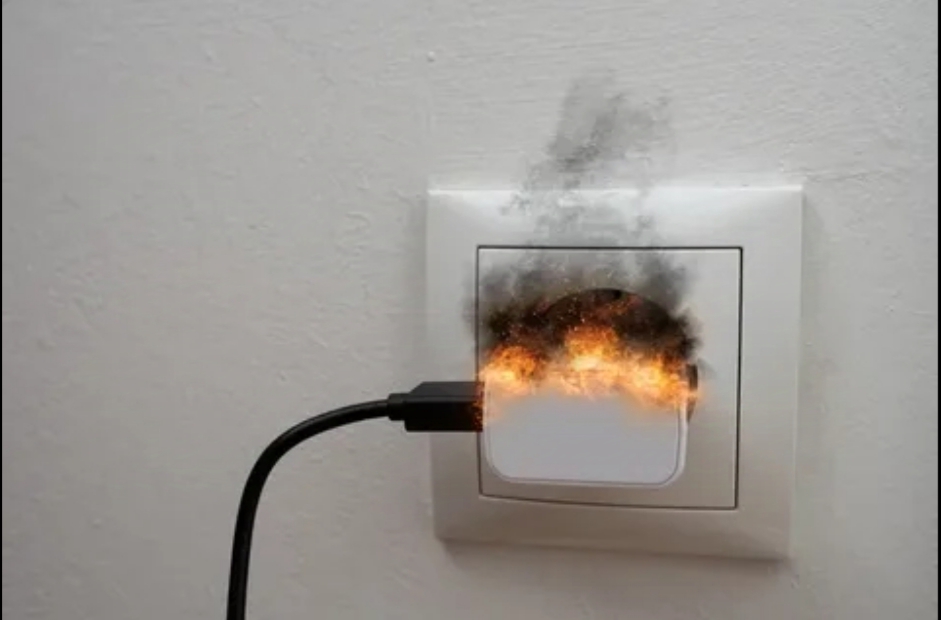Electrical fire hazards are a major concern in every household, especially in today’s world where we rely heavily on electrical appliances and gadgets. Many home fires result from issues that could have been easily prevented with proper awareness, maintenance, and ensuring that your home is up to date with an EICR Certificate. In this blog, we will explore the most common electrical fire hazards found in homes and provide practical tips on how to avoid them.
Faulty Wiring
Faulty wiring is one of the leading causes of electrical fires in homes. Outdated or damaged wiring can easily overheat, leading to sparks that can ignite nearby materials. This hazard is especially prevalent in older homes that have not been updated to modern electrical safety standards.
If your home is older or you notice frequent flickering lights, circuit breaker trips, or discolored outlets, it may be time to have your wiring inspected by a professional. A qualified electrician can assess your home’s electrical system and recommend necessary repairs or upgrades.
Overloaded Circuits
Overloading circuits by plugging too many appliances or devices into a single outlet can cause an electrical fire. When a circuit is overwhelmed by demand, the wires can overheat, leading to sparks and potential ignition.
To avoid this, make sure to distribute the load across multiple outlets and circuits. If you are constantly using power strips or extension cords, consider having an electrician install additional outlets to handle the demand. Always avoid daisy-chaining power strips, which can create a dangerous situation.
Extension Cord Misuse
Extension cords are convenient but can be a hidden danger if used improperly. Many people misuse extension cords by plugging in appliances or devices that draw more power than the cord is rated for, leading to overheating.
To avoid this hazard, use extension cords only as temporary solutions and never for high-power devices like space heaters or air conditioners. If you need a permanent power solution, have additional outlets installed in the areas where they are needed. Also, regularly check extension cords for any signs of wear or fraying, and replace them if necessary.
Outdated Appliances
Old or malfunctioning appliances can be a major fire hazard. As appliances age, their wiring can deteriorate, increasing the risk of short circuits or overheating. Appliances like refrigerators, stoves, and washing machines, which use significant amounts of power, can be particularly dangerous if they are not maintained or replaced when needed.
If your appliances are showing signs of wear, such as unusual sounds, overheating, or frayed cords, it may be time to replace them. Investing in newer, energy-efficient models can not only reduce the risk of electrical fires but also save you money on energy bills.
Space Heater Misuse
Space heaters are commonly used in colder months, but they can be dangerous if not used correctly. Placing a space heater too close to flammable materials like curtains, bedding, or furniture can result in a fire. Additionally, some space heaters can overheat or malfunction, especially if they are old or damaged.
To use a space heater safely, always place it on a flat, non-flammable surface and keep it away from anything that can catch fire. Look for models with built-in safety features like automatic shut-off if they tip over or overheat. Never leave a space heater running unattended, and unplug it when not in use.
Faulty Electrical Outlets
Damaged or improperly installed electrical outlets can lead to fires. Outlets with loose wiring, burn marks, or unusual heat should be replaced immediately. Using worn-out outlets can cause arcing, which generates sparks that can ignite nearby materials.
Regularly inspect the outlets in your home for signs of wear, and replace any that show damage. If you’re unsure how to safely replace an outlet, hire a licensed electrician to do the job. It’s also important to ensure that all outlets in potentially wet areas, such as bathrooms and kitchens, are equipped with Ground Fault Circuit Interrupters (GFCIs) for added protection.
Improper Use of Light Bulbs
Using light bulbs with a higher wattage than a fixture is rated for can cause overheating and eventually lead to a fire. Light fixtures, especially those in older homes, are designed to handle a specific wattage, and exceeding that limit can overheat the wiring within the fixture.
Always check the maximum wattage rating on your light fixtures and make sure the bulbs you use fall within that range. Consider switching to energy-efficient LED bulbs, which produce less heat and use less energy, reducing the risk of fire.
Electrical Blankets
While electric blankets can provide warmth and comfort during cold nights, they can also pose a fire hazard if used improperly. Blankets that are old, damaged, or left on for extended periods can overheat, potentially causing a fire.
To avoid this risk, regularly inspect your electric blanket for any signs of wear, fraying, or malfunction. Follow the manufacturer’s instructions carefully, and never leave an electric blanket on overnight or while unattended. If the blanket is more than a few years old, consider replacing it with a newer model that includes safety features like automatic shut-off.
Water and Electricity
Water and electricity are a deadly combination. Electrical fires can easily start in areas of your home that are exposed to moisture, such as bathrooms, kitchens, and basements. When water comes into contact with electrical devices or outlets, it can cause short circuits or shocks, which may lead to fires.
To prevent this hazard, make sure that electrical outlets in moisture-prone areas are equipped with GFCI outlets. These outlets are designed to shut off power when they detect a ground fault, providing an extra layer of protection. Additionally, never use electrical appliances near water, and ensure that any electrical work in these areas is done by a qualified professional.
DIY Electrical Work
Attempting to perform electrical work without the proper knowledge or training can be extremely dangerous. DIY electrical projects, such as rewiring, installing new outlets, or upgrading circuit breakers, can result in faulty installations that increase the risk of fires.
To avoid this, always hire a licensed electrician to perform any electrical work in your home. Even small tasks like changing a light fixture or replacing an outlet should be done by someone who understands the complexities of your home’s electrical system. This not only ensures your safety but also helps prevent costly mistakes down the road.
Conclusion
Electrical fire hazards are often overlooked in the home, but with proper precautions, many of these dangers can be avoided. From ensuring your wiring is up to date to using appliances correctly and maintaining electrical systems, small actions can significantly reduce the risk of fire. It is always wise to consult a licensed electrician if you suspect any issues with your home’s electrical system. By staying vigilant and addressing potential hazards early, you can protect your home and loved ones from the devastating effects of electrical fires.



